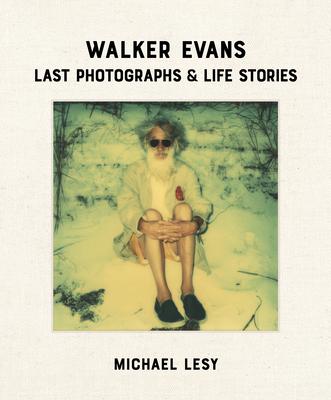In 1973, Michael Lesy was a young scholar whose first book had just been published. In the soon-legendary Wisconsin Death Trip he combined 1890s photographs and newspaper clippings to evoke a devastatingly tragic epoch, the real-world antithesis of the fanciful "Gay Nineties." It startled readers then and remains a touchstone of modern photographic interpretation.
That year Lesy met and became closefriends with the great photographer Walker Evans, who in the 1930s had collaborated with writer James Agee to create another towering landmark in the American photo-essay, Let Us Now Praise Famous Men. Old, frail, with just two years left to live, Evans was still urgently and obsessively photographing. "Outside the rooms he inhabited," Lesy writes, "the world was scattered with objects on their way to oblivion. He photographed them in their passage." Brief as their friendship was, it was intense and rewarding. Each admired the other; each saw himself reflected in the other: aesthetic visionaries who shared a radical belief that photographs were not flat and static documents--that "the plain truth of the images . . . wasn’t as plain as it seemed," Lesy explains. "Meanings, beliefs, and emotions lay crisscrossed under the surface of the most plainspoken photographs." Throughout his career in the classroom and in more than a dozen books, Lesy has continually inspired us to open our eyes, our minds, and our hearts to those many layers of meaning and feeling in photos, from seemingly ordinary snapshots to majestic landscapes.In this unconventional, lyrical biography, Lesy traces Evans’s intimate, idiosyncratic relationships with men and women--the circle of friends who made Walker Evans who he was. "Wonder and scrutiny produced the portraits Walker made in his prime," Lesy writes. Evans’s photographs of Agee, Berenice Abbott, Lady Caroline Blackwood, and Ben Shahn, among others, accompany Lesy’s telling of Evans’s life stories."Wonder and scrutiny, suffused with desire and dread, produced the portraits he made in his last years," Lesy notes. In the 1970s, Evans became enthralled with the Polaroid SX-70 and its colorful instant images, and he used it to take his last photographs--portraits of people, in extreme close up, and portraits of objects."Good clothes and good conversation, wit and erudition, originality and inventiveness, the charms of smart and pretty women--Walker took pleasure in being alive," Lesy writes. "He photographed objects as if they were people and people as if they were souls. All the while, he never forgot Blind Joe Death. The annihilations of the First War, the extinctions of the epidemic that followed it, the pyres and the pits--these he never forgot. The still silence of his images was, to the very last, transcendental, and always he remembered the skull beneath the skin."












